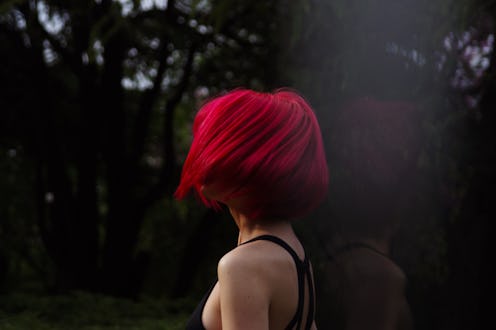September 23, 2017 is Bi Visibility Day, aka Bisexual Day, a holiday founded in 1999 not only to celebrate the bisexual community, but simply to bring it some attention to it. Why? Well, as a bisexual woman in a lesbian relationship myself, I can tell you that being bisexual feels like a punchline rather than a recognized orientation a lot of the time. When you're with a man, people think of you as straight and ignore any history you have with women. Now that I'm dating a woman, everyone I meet just assumes that I'm a lesbian — and speaks to me like I've never seen a a penis before (SPOILER ALERT: I have.). Plus, my girlfriend faced a lot of skepticism when she started dating me a — GASP — bisexual woman.
But this only scratches the surface of why we need Bi Visibility Day. Because all of these little prejudices and slights have added up to some real problems in the bisexual community. It goes beyond the annoying, incessant, questioning of "Is it a phase?" "Are you just gay now or something?" "DO YOU WANT TO HAVE A THREESOME?"
There are issues of mental and sexual health that have arisen from the attitudes toward bisexuals — from outside and inside the queer community. Here's why this day is so important:
Because Some People Still Don't Even Believe Bisexuality Exists
I CAN'T WITH THIS ONE. I've gotten it so many times — and I'm definitely not alone. “[A therapist] thought that because I was bisexual, I was in an experimentation phase and was I gay or was I not,” Nicole, 25, told Bustle. “I was and am perfectly comfortable with being bisexual. So that was difficult — the idea that the only problem I could be dealing with was self-discovery.”
In a 10-year study published in Developmental Psychology, it was found that 92 percent of women who identified as bisexual at the beginning of the study still identified as bisexual 10 years later. Guess what? It's not a phase.
Because There's Also Prejudice Within The Queer Community
There are some prejudices that exist both inside and outside the queer community — perhaps the most stubborn one is the idea that bisexual people are less faithful. It's so wrong. In the same study, 89 percent of bisexual women studied were in long-term, monogamous relationships. Sexuality has nothing to do with your sex drive — or your moral compass. And yet there are still lesbian dating apps where you can filter out bisexual women and there are still guys who aren't interested in dating someone bisexual. We're perceived as being less trustworthy for absolutely no good reason.
Because It's Affecting Mental Health In The Bisexual Community
Some people assume that bisexuals can retreat into straight privilege when we please, as not though we don't understand what it's really like to be discriminated against. And, personally, I've gotten off pretty lightly. I've never suffered any physical abuse because of my sexuality. But the men and women calling me a dyke on the street and the people sending me threatening internet hate don't seem to be put off by the fact that I'm bisexual. If anything, it just incites them more.
And for some members of the bisexual community, it's taking a serious toll. A Human Rights Council report found that bisexuals had higher rates of anxiety, depression, and STIs than any other group. "Bisexual people are the largest single group within the LGBT community, but we're not addressing their specific healthcare needs,” said Tari Hanneman, Deputy Director of the Health and Aging Program at the HRC Foundation, in a press release. “The reality is that bisexual people face discrimination not only outside of our community, but also from within. And that can discourage them from engaging in and benefitting from the work that LGBT advocates are doing to address our mental, physical, and sexual health."
So this Bi Visibility Day, let's take the time to debunk the myths around bisexuality and set the record straight about what it really means to be bi, because the misconceptions are clearly affecting the community.
